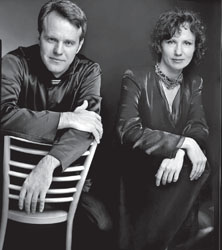There are many performers who emphasise the existence of a challenging gap between the lovers of new music and those admiring the traditional concert repertoire: what attracts the former is disliked by the latter, and vice versa. It appears, however, that this does not cause any considerable problems to one of the most remarkable old-timers of the Lithuanian concert stages – the Ibelhauptas Piano Duo.
|

photo: Paulius Gasiūnas
|
The pianists Rūta and Zbignevas Ibelhauptas are tireless promoters of piano duo genre since 1989. These artists capture attention first and foremost by their imaginatively compiled programmes and non-stereotypical performance ideas. The interaction of their multi-faceted fields of interests and their romantic-charismatic image is fascinating indeed: always willing to please the audience with their virtuoso bravura, the Ibelhauptas Duo excellently conforms to all standards of ‘ascetic’ academism as well, and at the same time challenges their listeners to discover the uncharted territories of new music.
The wide repertoire of the duo includes music for two pianos and for piano four hands, ranging from the Baroque era to our days, as well as rarely performed works. The duo gives special attention to the 20th century classics (Béla Bartók, Benjamin Britten, Paul Hindemith, Arthur Honegger, György Ligeti and Witold Lutosławski); Visions de l`Amen by Olivier Messiaen as rendered by the Ibelhauptas was acclaimed by the critics as an extraordinary cultural event in Lithuania. The pianists’ repertoire also abounds in most recent works by contemporary composers – opuses by Leonid Desiatnikov, Eugeniusz Knapik, Raimo Kangro, David Lang and others, composed on commission from various contemporary music festivals and exclusively for the duo’s recitals.
What attracts the performers in this plethora of styles? Skipping through the Ibelhauptas’ programmes, one could notice pianists’ predilection for romantic concert virtuosity; the majority of contemporary compositions performed by them require particular mastery as well. It is no wonder, that the pianists mention the works by composers who are also practicing pianists as having brought them exceptional pleasure while performing: “Out of all works by contemporary composers that we have performed, we probably enjoyed Tha‘ Munnot Waste No Time by Eugeniusz Knapik most of all. It is a memorable, somewhat romantic, though clearly contemporary musical language, yet this composition is notable first of all because of the composer-pianist’s extensive use of the instrument’s timbral, dynamic, and other characteristics – his music is particularly piano-oriented.”
Openness to innovation and high performance quality of the Ibelhauptas Duo has paved the way for their participation in numerous new music festivals in Lithuania and other countries. The ensemble dedicates particular attention to contemporary Lithuanian music: the Ibelhauptas are the inspirers and first performers of many works by Lithuanian composers. If asked about Lithuanian composers with whom they have collaborated the most, the pianists could make a long list of compositions by Osvaldas Balakauskas, Vytautas Barkauskas, Vidmantas Bartulis, Vytautas Germanavičius, Jurgis Juozapaitis, Zita Bružaitė, Rytis Mažulis, and others. It is no less important that many of these works successfully find a permanent place in the concert repertoire, or at least do not go unnoticed. As one of the highlights of the recent years, the concerto for two pianos and symphony orchestra titled Seventh Heaven by Remigijus Merkelys should be mentioned.
Even if they are not the sole performers of a certain composition, the Ibelhauptas always leave their imprint on it. This is probably best revealed by their creative union with two very different Lithuanian composers – Bronius Kutavičius and Gintaras Sodeika. It is these composers’ successful and remarkable compositions (acting as a certain landmark of Lithuanian music in the Ibelhauptas’ programmes) that reflect the interaction which proves to be enriching both the compositions and the performers. Though Kutavičius has composed only one work exclusively for the Ibelhauptas Duo – Little Boat of Gilija (2000) for piano four hands and choir, the duo often plays The Little Performance (1975) for actress, two violins and two pianos, Debate with a Stranger (1982), and Cranes’ Dances (1986-89) with great pleasure. Several works by Gintaras Sodeika are associated with the Ibelhauptas Duo even more closely: these performers prepared the premieres of his Force majeure for two pianos and orchestra (2000) and Iodio for three pianos (together with Petras Geniušas, 2002); it would also be difficult to imagine the pulsating tensions of one of the most popular compositions by Sodeika – Tone Ontology No. 2 (1998) – without the frenzied charge of the Ibelhauptas’ performance.
It is the glimmering virtuosity and pulsating toccatas typical of Sodeika’s style that can be attributed to the qualities causing particular admiration of the duo’s fans. In the recent years the theatrical persuasiveness characteristic of the duo’s performance has been obviously enriched by the new qualities – mature subtlety and restrained power. After so many years of their creative activity one thing is evident: it is equally fascinating to listen to Ibelhauptas; most diverse programmes, be it Brahms’ Love Songs or the vortexes of new music at the Gaida Festival.
© Lina Navickaitė
Lithuanian Music Link No. 13
REPERTOIRE HIGHLIGHTS
for two pianos
Bronius Kutavičius. Debate with a Stranger (2pf-tape, 1982), 15’
Gintaras Sodeika. Tone Ontology No. 2 (1998), 8’
Algirdas Martinaitis. Clavier of the Life-giving Water (2pf-tape, 1983), 13’
Onutė Narbutaitė. Climber (1988), 12’
Vytautas Bacevičius. Septième mot Op. 73 (1966), 10’

